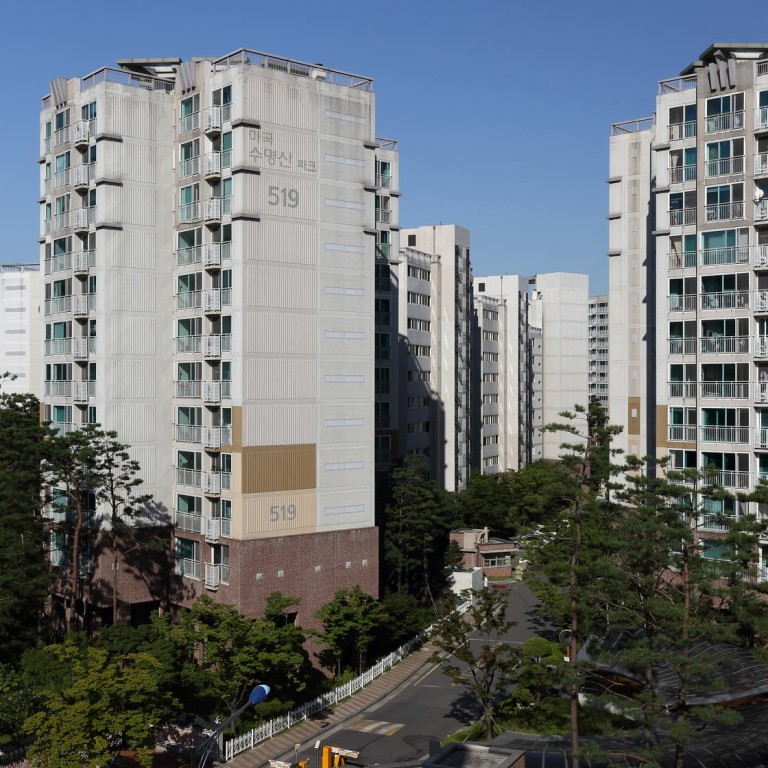
More South Koreans opting to lease as home values fall, pushing up rents
With market mired in worst slowdown for 13 years, government cuts property taxes to boost sales, but analysts doubt leasing boom will end
Kim Joon-hyung met more than 20 realtors and searched for months to find a place to rent in Seoul. In July, he finally signed a two-year contract on a two-bedroom apartment.

"I finally gave up," said 34-year-old Kim, a marketer at a home-appliance company who's getting married this month. "This monthly-charge rental home was the only thing available."
South Koreans like Kim are increasingly choosing to rent rather than buy, driving up costs of leasing amid expectations that home prices, mired in the worst slowdown in 13 years, will fall further.
Their loss of faith in the housing market prompted President Park Geun-hye to announce measures last month "to shift demand from rentals to home purchases", including cutting home-purchase taxes, bucking a trend from Singapore to Hong Kong where governments are trying to curb potential property bubbles.
"For the government, it must be a big task to tackle rents with not much policy room," said Choi Seong-heon, an analyst at Real Estate 114, a Seoul-based real estate information provider.
The tax cuts "may spur transactions a little in the beginning, but the impact may be short- lived. Tax cuts don't seem enough to expel the anxiety over price declines."
Home prices fell 4.3 per cent between January 2012 and last month in Seoul and the surrounding metropolitan area, according to Kookmin Bank data.
The consumer price index that tracks rents gained 2.8 per cent in the January-August period compared with the same period last year, more than double the 1.3 per cent gain in the broader CPI this year, Statistics Korea said earlier this month.
"The rent price surge is evidence that people don't believe that home prices will rise," said Suh Jeong-yeal, a real estate and finance department professor at Youngsan University based in Gyeongnam province.
"Why would people put their money into a depreciating asset? As long as pessimism dominates, people will stay in the rental market."
Home prices in South Korea have been stagnant since they peaked in 2008 after a 41 per cent surge in the previous four years elevated household debt to record levels.
A shortage of supply in key metropolitan areas had undermined government measures from 2003 to 2007 to cool the market, such as higher property taxes and tougher mortgage lending rules that included introducing debt-to-income and loan-to-value ratios to reduce the amount borrowers could get from banks.
Efforts to breathe life back into the property market since 2008 - including temporary tax cuts, relaxing the debt-to- income measures that apply to mortgage loans and increasing home supply - have stumbled after the global financial crisis.
The average apartment transaction price in Seoul was 488 million won (HK$3.41 million) in August, down 9.8 per cent from January 2012, according to data from the Korea Appraisal Board, a state- run agency. In the capital's metropolitan area, it was 332 million won, down 9.2 per cent in the same period.
President Park has identified reversing the sluggishness in the residential market as key to bolstering economic growth and to fulfil her pledge to usher in a "people's happiness era".
The government will cut home-purchase taxes and increase the supply of cheaper mortgages to spur homebuying, as well as adding to rental housing stock and giving tax breaks on rental expenses for low-income households.
"Even people who can afford buying homes are now preferring to rent due to the concerns over prices dropping," Park Won-gap, the senior real estate market analyst at Kookmin Bank, said. The steps "may persuade a limited number of people who are about to buy homes, but it likely won't create massive new demand", he said.
The nation's rental market is also experiencing a shift. With interest rates at a more than six-year low and little prospect of capital appreciation if homes are sold, some South Korean landlords have been prompted to abandon , a lump-sum-deposit rent dominant since the 1870s and widely used as a financing tool from the 1980s to the early 2000s when mortgage loans were scarce.
Landlords typically used the upfront deposit - which is returned to the tenant at the end of the rent contract - as a down payment on other properties when prices were rising. Now they are opting for contracts that stipulate monthly rents because there is little prospect of capital gain if they buy another home, and returns from bonds and stocks are lower than rental yields.
The number of monthly-rent contracts jumped 23 per cent in the first seven months of this year from the same period last year, according to the land ministry data. They accounted for 39 per cent of all rent transactions in the seven months to the end of July, the highest proportion since the ministry started gathering the data in 2011, as more landlords began asking for monthly leases.
"Monthly rents will be the major stream sooner or later," said Youngsan University's Suh. "We may see the emergence of home rental companies like in Western countries. The Korean rental market is facing structural change."

